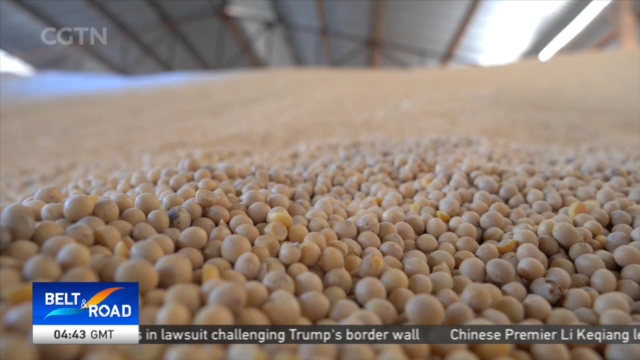
13:17, 08-Apr-2019
Big Projects: Russian soybeans replace US source for Chinese
Updated
13:10, 11-Apr-2019
03:24

After a dramatic reduction in China's imports of soybean from the United States due to the trade frictions, Russia with its vast, arable fields quickly stepped in, offering Chinese buyers more value for money. CGTN's Aljosa Milenkovic reports.
Some 50 kilometers southeast of Blagoveschensk, the capital of Russia's Amur Region, is the small village of Razdolynoe. It is special because it has continued traditional Soviet-style collective farming with 21st-century practices 30 years after the Soviet Union's collapse. The Partizan collective farm was founded back in 1930. Since then, it has been led by only three directors. With current one, Viktor Silohin at the helm, Partizan grew into a modern producer of ecologically clean grains that annually delivers over 70,000 tons of crops. It has more than 80 combine harvesters, dozens of heavy tractors, as well as livestock farms. It also employs over 400 workers. But Partizan's main trump card is soybeans.
ALJOSA MILENKOVIC RAZDOLYNOE "This entire area is now covered in snow. But in spring, it will turn into colorful fields of soybeans -- the Partizan collective farm's main source of income and one of the strongest export products in the entire region."
Due to the US-China trade war, buyers from neighboring Chinese towns have flocked to Russias Amur Region, clearing out all their soybean stocks. And demand is expected to rapidly grow after the completion of two new bridges over the Amur River, which will link the region with neighboring China.
VIKTOR SILOHIN GENERAL DIRECTOR, PARTIZAN AGROCOMPANY "The government's duty here in the Amur Region is to increase soybean production for China. China demands a lot of it from us because our soybeans don't contain GMOs. We do not also use any GMO products and that's why the quality of our crops is good. We apply all the regular treatments. The demand for our crops is significant."
From the 41,000 tons of soybeans that Partizan produced in 2018, this is all that remains. And a buyer will soon to come, clear out the remaining stocks. One of their customers is ANK, a local export company based in Blagoveschensk. They do not only export soybeans but also process them into soybean oil – all for export to China. Demand is far exceeding production, so they've decided to expand.
STEPAN INYUTOCHKIN EXECUTIVE DIRECTOR, SOYA ANK "In the beginning, we had plans to increase our production capacity twofold to 150 thousand tons of soybeans per year. And it'll happen by the end of the next year. Aside from that, the Chinese market is beginning to appreciate eco-friendlier products and our soybean oil is without any GMOs. This is why the demand for our products is very high, not just in China, but in other Asian countries as well."
Due to a lack of reliable transportation links with China, suppliers can only send their goods across the river for nine months a year. As the two bridges near completion and with both sides eager to further their collaboration, companies in the Amur region, like Partizan and ANK, can look forward to a brighter future. Aljosa Milenkovic, CGTN, Razdolynoe Village, Amur Region.

SITEMAP
Copyright © 2018 CGTN. Beijing ICP prepared NO.16065310-3
Copyright © 2018 CGTN. Beijing ICP prepared NO.16065310-3